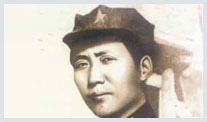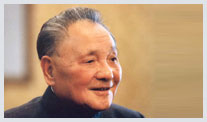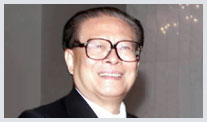|
Head of second generation of CPC leaders: Deng Xiaoping 
|
| 2002-09-09 10:20:11 |
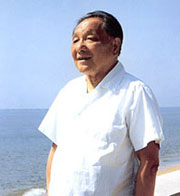 Deng Xiaoping (1904-1997) was born in Xiexing Township, Guang'an County of Sichuan Province on August 22,1904. Deng Xiaoping (1904-1997) was born in Xiexing Township, Guang'an County of Sichuan Province on August 22,1904.
In 1920, at the age of 16, Deng Xiaoping went to France to learn industrial skills through work and study for the benefit of the country.
In 1922, he joined the Chinese Socialist Youth League in Europe. In the second half of 1924, he joined the Chinese Communist Party and became one of the leading members of the General Branch of the Youth League in Europe. During the five years he spent in France, from age 16 to 21, Deng Xiaoping was transformed from a patriotic youth into a Marxist.
 In early 1926, Deng Xiaoping left France for the Soviet Union to study.
In early 1926, Deng Xiaoping left France for the Soviet Union to study.
In the summer of 1931, with the approval of the Central Committee, Deng Xiaoping went to the Central Revolutionary Base Area in southern Jiangxi and western Fujian.
During the War of Resistance against Japanese Aggression, Deng Xiaoping was appointed deputy director of the Political Department of the Eighth Route Army and, shortly afterwards, political commissar of its 129th Division, of which Liu Bocheng was commander. Liu and Deng jointly established several anti-Japanese bases such as the Shanxi-Hebei-Henan base, which played a very important role in the anti-Japanese war.
 During the period of the War of Liberation, in the decisive campaigns---Huai-Hai and the crossing of Changjiang (Yangtze River) campaigns, Deng was appointed as secretary of the General Front-line Committee. Deng Xiaoping and other leaders such as Liu Bocheng and Chen Yi directed the crossing of the Changjiang (Yangtze River) and went on to liberate Nanjing and Shanghai and the vast areas of Jiangsu, Anhui, Zhejiang and Jiangxi Provinces.
During the period of the War of Liberation, in the decisive campaigns---Huai-Hai and the crossing of Changjiang (Yangtze River) campaigns, Deng was appointed as secretary of the General Front-line Committee. Deng Xiaoping and other leaders such as Liu Bocheng and Chen Yi directed the crossing of the Changjiang (Yangtze River) and went on to liberate Nanjing and Shanghai and the vast areas of Jiangsu, Anhui, Zhejiang and Jiangxi Provinces.
The liberation of Nanjing signaled the collapse of the Kuomintang government.
In July 1952, the Central Committee of the Communist Party transferred Deng Xiaoping to the central organs. He served first as both executive vice-premier of the Government Administration Council (which was to become the State Council in 1954) and vice-chairman of the Financial and Economic Commission, and was soon appointed director of the Office of Communications and Minister of Finance as well. In 1954, besides retaining the position of vice-premier, he became in addition secretary-general of the Party Central Committee and vice-chairman of the National Defense Commission.
In 1955, at the Fifth Plenary Session of the Seventh Central Committee, he was elected to the Committee's Political Bureau. In 1956, at the Party's Eighth National Congress, it was Deng who made the report on the revision of the Party Constitution. At the First Plenary Session of the Eighth Central Committee, he was elected member of the Standing Committee of the Political Bureau and general secretary of the Central Committee.
During the "Cultural Revolution," Deng Xiaoping was twice discredited and removed from office and went through the most painful ordeal in his revolutionary career.
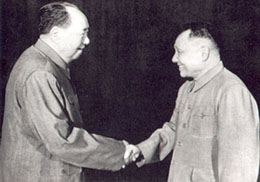 In 1973, he was restored to his post as vice-premier of the State Council. In 1974 he delivered a speech at the Sixth Special Session of the United Nations General Assembly on behalf of the Chinese government, in which he systematically set forth Mao Zedong's thesis of the three worlds.
In 1973, he was restored to his post as vice-premier of the State Council. In 1974 he delivered a speech at the Sixth Special Session of the United Nations General Assembly on behalf of the Chinese government, in which he systematically set forth Mao Zedong's thesis of the three worlds.
In December 1978, the Third Plenary Session of the Party's 11th Central Committee was convened. This session marked a fundamental turning point in the history of the Chinese Communist Party. At a working conference of the Central Committee held before the Session, Deng delivered a speech that turned out to be the keynote of the Third Plenary. In this speech he explained in detail that people should emancipate their minds and seek truth from facts.
In June 1981, the Sixth Plenary Session of the 11th Central Committee adopted a resolution on the subject entitled "Resolution on Certain Questions in the History of Our Party since the Founding of the People's Republic of China." It was Deng who presided over the drafting of this landmark document. This resolution helped greatly unify the thinking of the whole Party and ensure political unity and stability throughout the country.
In September 1982, the Party held its 12th National Congress. At that Congress Deng summed up China's recent historical experience and drew a basic conclusion: the universal truth of Marxism must be integrated with the concrete realities of China, and China must build socialism with Chinese characteristics.
China is now at the primary stage of socialism. Throughout this stage the basic line of the Party in building socialism with Chinese characteristics is as follows: to lead the people of all our nationalities in a united, self-reliant, intensive and pioneering effort to turn China into a prosperous, strong, democratic, culturally advanced and modern socialist country by making economic development while adhering to the Four Cardinal Principles and persevering in reform and the open policy.
Standing in the forefront of the times, Deng Xiaoping is the man who is leading China's reform. People regard him as the chief architect of the reform, which is designed to improve the socialist system and push forward the drive for modernization.
In order to resolve the questions of Taiwan, Hong Kong and Macao and to reunify China, Deng formulated the concept of "one country, two systems." The concept is an important part of building socialism with Chinese characteristics. In 1997 and 1999, Hong Kong and Macao returned to the arms of their motherland.
Through a lifetime of service to the people, Deng Xiaoping has earned the respect and affection of millions of his compatriots.
|
|








